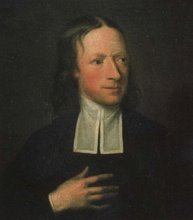The Character of a Methodist (part 3)
2. Neither are words or phrases of any sort. We do not place our religion, or any part of it, in being attached to any peculiar mode of speaking, any quaint or uncommon set of expressions. The most obvious, easy, common words, wherein our meaning can be conveyed, we prefer before others, both on ordinary occasions, and when we speak of the things of God. We never, therefore, willingly or designedly, deviate from the most usual way of speaking; unless when we express scripture truths in scripture words, which, we presume, no Christian will condemn. Neither do we affect to use any particular expressions of Scripture more frequently than others, unless they are such as are more frequently used by the inspired writers themselves. So that it is as gross an error, to place the marks of a Methodist in his words, as in opinions of any sort.
3. Nor do we desire to be distinguished by actions, customs, or usages, of an indifferent nature. Our religion does not lie in doing what God has not enjoined, or abstaining from what he hath not forbidden. It does not lie in the form of our apparel, in the posture of our body, or the covering of our heads; nor yet in abstaining from marriage, or from meats and drinks, which are all good if received with thanksgiving. Therefore, neither will any man, who knows whereof he affirms, fix the mark of a Methodist here, -- in any actions or customs purely indifferent, undetermined by the word of God.
4. Nor, lastly, is he distinguished by laying the whole stress of religion on any single part of it. If you say, "Yes, he is; for he thinks 'we are saved by faith alone:'" I answer, You do not understand the terms. By salvation he means holiness of heart and life. And this he affirms to spring from true faith alone. Can even a nominal Christian deny it? Is this placing a part of religion for the whole? "Do we then make void the law through faith? God forbid! Yea, we establish the law." We do not place the whole of religion (as too many do, God knoweth) either in doing no harm, or in doing good, or in using the ordinances of God. No, not in all of them together; wherein we know by experience a man may labour many years, and at the end have no religion at all, no more than he had at the beginning. Much less in any one of these; or, it may be, in a scrap of one of them: Like her who fancies herself a virtuous woman, only because she is not a prostitute; or him who dreams he is an honest man, merely because he does not rob or steal. May the Lord God of my fathers preserve me from such a poor, starved religion as this! Were this the mark of a Methodist, I would sooner choose to be a sincere Jew, Turk, or Pagan.
3. Nor do we desire to be distinguished by actions, customs, or usages, of an indifferent nature. Our religion does not lie in doing what God has not enjoined, or abstaining from what he hath not forbidden. It does not lie in the form of our apparel, in the posture of our body, or the covering of our heads; nor yet in abstaining from marriage, or from meats and drinks, which are all good if received with thanksgiving. Therefore, neither will any man, who knows whereof he affirms, fix the mark of a Methodist here, -- in any actions or customs purely indifferent, undetermined by the word of God.
4. Nor, lastly, is he distinguished by laying the whole stress of religion on any single part of it. If you say, "Yes, he is; for he thinks 'we are saved by faith alone:'" I answer, You do not understand the terms. By salvation he means holiness of heart and life. And this he affirms to spring from true faith alone. Can even a nominal Christian deny it? Is this placing a part of religion for the whole? "Do we then make void the law through faith? God forbid! Yea, we establish the law." We do not place the whole of religion (as too many do, God knoweth) either in doing no harm, or in doing good, or in using the ordinances of God. No, not in all of them together; wherein we know by experience a man may labour many years, and at the end have no religion at all, no more than he had at the beginning. Much less in any one of these; or, it may be, in a scrap of one of them: Like her who fancies herself a virtuous woman, only because she is not a prostitute; or him who dreams he is an honest man, merely because he does not rob or steal. May the Lord God of my fathers preserve me from such a poor, starved religion as this! Were this the mark of a Methodist, I would sooner choose to be a sincere Jew, Turk, or Pagan.
Subscribe to:
Post Comments (Atom)

No comments:
Post a Comment